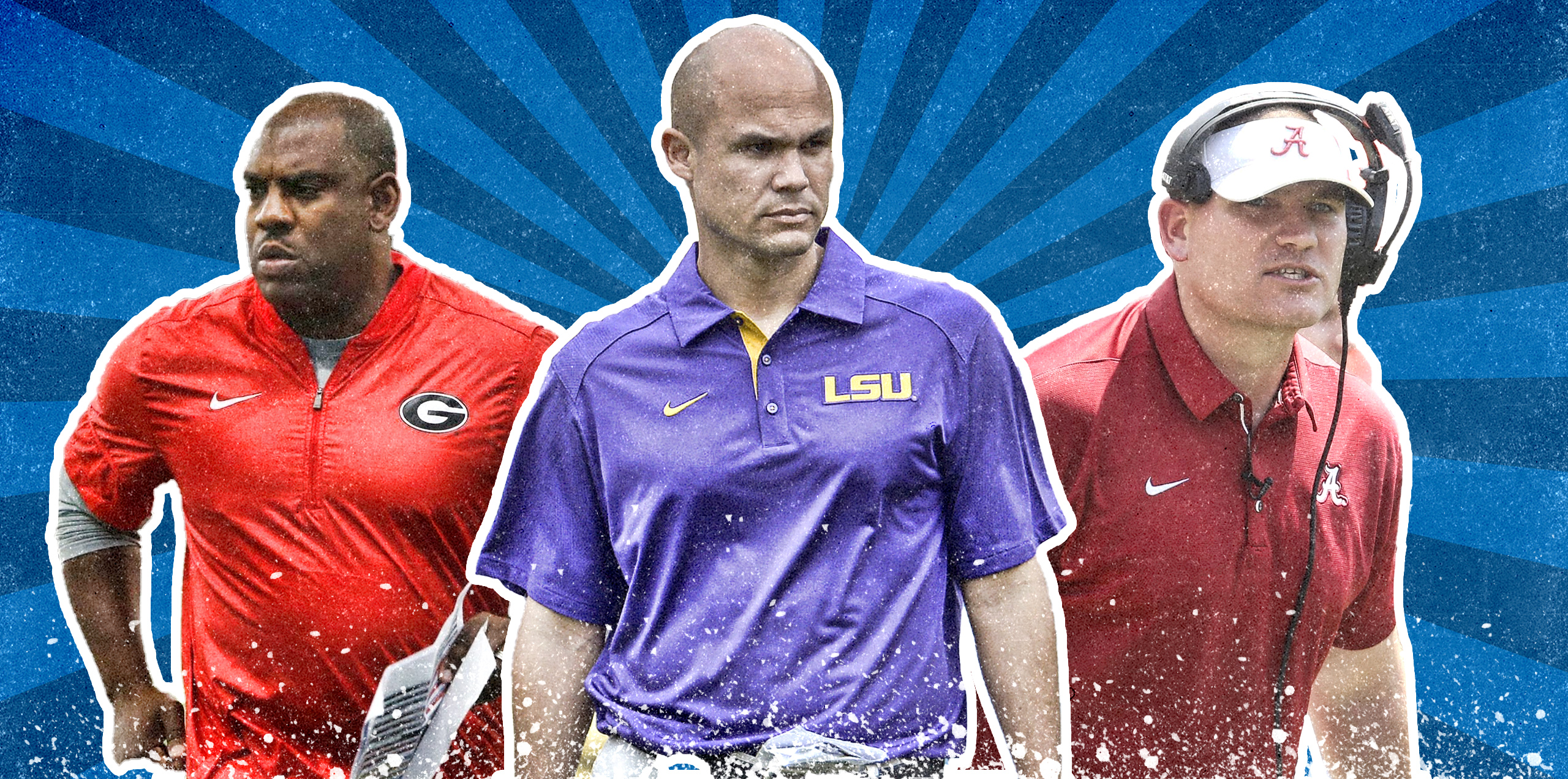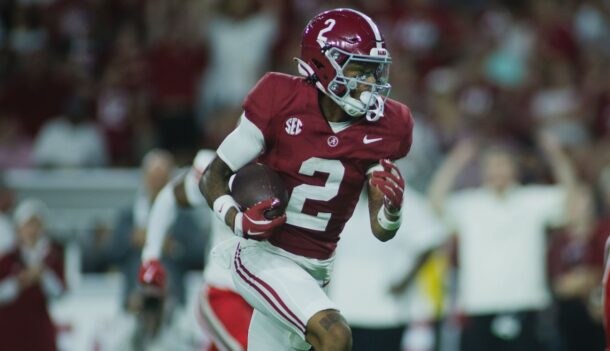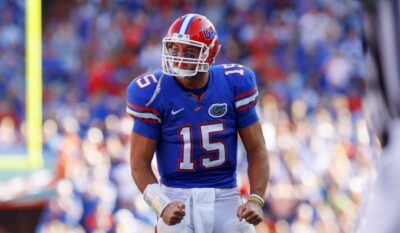
Here’s how we grade the SEC’s defensive coordinators for the job they did in the 2018 regular season.
Alabama, Tosh Lupoi: B
Midway into the season, it appeared Alabama was suffering a dropoff following the departure of Jeremy Pruitt, but those concerns were quickly put to bed with an outstanding finish. It’s always tough to grade Alabama defensive coordinators considering the unit is under Nick Saban’s watchful eye, but credit Lupoi for getting the most out of his vast number of playmakers, and for not really being exposed on the back end despite playing a number of largely inexperienced players. The back-to-back shutouts to start November deserve a heap of praise.
Arkansas, John Chavis: C
The defense certainly wasn’t the issue in Fayetteville, but the talent, depth and lack of attention to detail caught up to this unit by season’s end. It’s pretty remarkable that this Arkansas team hit an all-time low at 2-10 but still managed to achieve a shutout against an FBS opponent. That should tell you that Chavis still knows what he’s doing, he just didn’t have much to work with, and the offense rarely put this team in contention on most weekends.
Auburn, Kevin Steele: C-
Hard to completely fault Steele for the team’s defensive efforts, but the unit failed to play up to last season’s stellar performance. The fourth quarter against LSU was just the first of many failures for this unit, including getting beaten single-handedly by Nick Fitzgerald’s legs, getting embarrassed by the worst team from the SEC East (Tennessee) and losing steam in the second half against the program’s biggest two rivals (Georgia and Alabama). Getting opponents off the field on third downs was an issue, and the run defense took a step back despite being loaded in the front seven.
LSU, Dave Aranda: A
To no one’s surprise, the nation’s highest-paid assistant coach earned his paycheck. The only truly disappointing performance came against Florida, when LSU’s run defense was exposed. But Aranda immediately delivered masterful game plans against Georgia and Mississippi State in consecutive weeks to save the season. Had the Tigers not lost their top pass rusher in the first game of the season, this defense could have been special. Missing K’Lavon Chaisson and being without Devin White for the first half of the Alabama game really hurt, but Aranda may have set the blueprint for slowing down Tua Tagovailoa — as others seemed to pick up on what LSU did to the Alabama QB. Since that contest, he hasn’t quite looked the same.
Ole Miss, Wesley McGriff: F
There’s a reason McGriff was fired immediately after the Egg Bowl: his unit was the worst in the SEC once again. The Ole Miss defense didn’t show much fight with the exception of Texas A&M game and in the Egg Brawl, and it cost him his job. While the Rebels had been dealt a bad hand due to NCAA recruiting sanctions and some unfortunate injuries, the lack of effort and execution in run defense was hard to watch at times. It wasn’t a surprise to see Matt Luke cut McGriff go; the only wonder was that it took him so long.
Mississippi State, Bob Shoop: A+
Shoop did a masterful job, as the Frank Broyles Award finalist led what I consider to be the nation’s best defense. Credit for keeping the team’s hopes alive during the early offensive struggles in conference play belongs to Shoop’s unit. While the defense did give up 28 points on the road to Kentucky, that contest was in reach entering the fourth quarter. Had the offense showed up to consistently lend a hand, there’s an outstanding chance MSU’s defense would have never surrendered more than 24 points the entire season. The defense also held Alabama to its lowest output of the season (24 points), and that result was aided by some Crimson Tide home cooking served up by the officials. For all the offseason hype in Starkville, this unit not only met them, it exceeded them.

Texas A&M, Mike Elko: A
Jimbo Fisher deserves the credit for the Aggies’ offensive progression, but Elko deserves similar praise for turning a defense with a reputation as soft into the SEC’s No. 1 rushing defense in a single season. Outside of the Alabama contest and the LSU seven-overtime thriller, the Aggies did not surrender more than 28 points in a single game (LSU had 31 heading into overtime). When you consider some of last season’s results against A&M — UCLA scored 45, Arkansas 43, Auburn 42, LSU 45 and Wake Forest 55 — it puts into context the job done by Elko. The main blemish came on the road at Auburn, as the Aggies had a double-digit lead in the fourth quarter but allowed Jarrett Stidham to carve them up through the air and steal a win.
Florida, Todd Grantham: B+
Grantham was my pick for the nation’s top assistant coach last season, and he continued to deliver incredible first-year turnarounds. The Gators, in particular the defense, showed toughness and aggressiveness not seen in recent seasons, carrying Dan Mullen’s first team to a New Year’s Six bowl game. Had the unit not suffered some tough injuries to its thin secondary, the season could have played out much differently. The only thing keeping this grade from being an “A” was the performances against Georgia and Missouri. On the flip side, credit Grantham for making in-game adjustments against South Carolina that saved the season in Gainesville the following week.
Georgia, Mel Tucker: B
The narrative of Georgia having young, inexperienced defenders replacing several All-SEC-caliber players took all of two weeks to disappear under Tucker’s watch. The game in Death Valley wasn’t pretty, but outside of the LSU contest and maybe the Missouri game, this unit physically dominated every opponent it saw leading up to the SEC Championship Game. The game plan against Tua Tagovailoa and Alabama was masterful and would have resulted in a win had Jalen Hurts not come off the bench and delivered some heroics. Tucker is due plenty of credit and deserved his promotion to head coach at Colorado. Georgia could have its hands full replacing him.
Kentucky, Matt House: A+
Kentucky’s transformation on defense was incredible. While the unit was led by an All-American-level performance from Josh Allen, it took several players taking their game to new heights for the Wildcats to reach the heights they did. Keep in mind, this unit did not allow more than 20 points in a contest until November. That’s an Alabama-like stat right there. In only his second season as the team’s DC, House deserves incredible praise for taking a unit that was average at best and turning it into one of the SEC’s best.
Missouri, Ryan Walters: B-
A rough start to the season is a tough thing to overcome, but Missouri’s defense managed to do that during the final six games. The Tigers went 5-1 during that time and were a defensive pass interference call away from going 6-0. The toughness and physicality of Mizzou’s defense went to another level under Walters, and it showed during the grind of the SEC schedule. The offense failed to hold up its end of the bargain during much of that stretch, which negatively affected the defense in some respects. But outside of the game at Alabama, Walters’ unit was never truly exposed. Barry Odom’s decision to promote Walters may have been viewed as a stretch at the time, but it proved to be another shrewd move by the Missouri coach.
South Carolina, Travaris Robinson: C-
With the defensive hype Will Muschamp and Robinson brought with them to Columbia, the results have been largely underwhelming in their three years. This season was another mixed bag, as the front seven was dominated at times in key games but an inexperienced defensive backfield showed real promise. Credit the defensive staff for making the right calls in the second half against Missouri, Tennessee and Ole Miss, but lack of adjustments lost the Gamecocks the Texas A&M, Florida and Clemson games. If this unit doesn’t take a major step forward next season, Muschamp may have to make a tough decision about his longtime assistant.
Tennessee, Kevin Sherrer: C
Sherrer is another tough one to grade, as this is Jeremy Pruitt’s defense, with the head coach calling the defensive plays on game day. However, we can grade the inside linebackers for Sherrer. That unit was largely inconsistent, although it dealt with some injuries. Going up against efficient passing teams, Tennessee’s defense had no chance. Going up against terrific offensive lines was much the same. Throw in the fact that the unit struggled to get to the passer, and that’s a mix for some disastrous results. The Vols certainly got that at times, but overall, the defense led the way more often than not.
Vanderbilt, Jason Tarver: C+
There’s no real insight in saying a 6-6 team was largely inconsistent, but that was the case with the Commodores. There were plenty of positives and negatives to take away from Tarver’s first season in Nashville, but far too often his unit came up short when it mattered the most. Against inferior competition, Vanderbilt’s defense looked solid. Against the toughest competition on the schedule, Vanderbilt’s defense was overmatched. Was that a product of the talent on the field or the coaching? That’s hard to say, but in winnable games (Notre Dame, Florida, Missouri), Vanderbilt’s defense faltered far too often down the stretch.
A graduate of the University of Tennessee, Michael Wayne Bratton oversees the news coverage for Saturday Down South. Michael previously worked for FOX Sports and NFL.com







